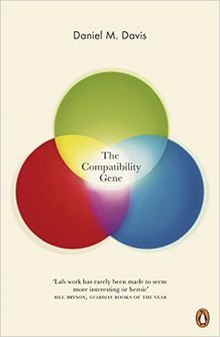Daniel M. Davis
 |
|
| Author | Daniel M. Davis |
|---|---|
| Subject | Immunology |
| Genre | Popularisation of science |
| Publisher | Penguin |
|
Publication date
|
2014 |
The Compatibility Gene is a 2014 book about the discovery of the mechanism of compatibility in the human immune system by professor Daniel M. Davis. It describes the history of immunology with the discovery of the principle of graft rejection by Peter Medawar, and the way the body distinguishes self from not-self via natural killer cells. The compatibility mechanism contributes also to the success of pregnancy by helping the placenta to form, and may play a role in mate selection.
Davis was born on 2 August 1970. He gained a bachelor's degree in physics from the University of Manchester in 1992, and then a doctorate in physics at Strathclyde University. He went to Imperial College as a lecturer in 1999, becoming a professor of molecular immunology there in 2005. In 2013 he became director of research at the University of Manchester's collaborative centre for inflammation research and professor of immunology there. He is a fellow of the Academy of Medical Sciences.
Davis is a recognised expert for his research in the immune synapse, membrane nanotubes, and natural killer cells. These last are elements of the immune system which recognise cancer cells as non-self and kill them, defend against infection and regulate the formation of the placenta.
The book's context is the history of immunology, from old questions about why we become ill and why we may recover to the 19th century pioneers who demonstrated that bacteria caused many diseases. In the 20th century where, slowly at first but at an accelerating pace, biologists started to piece together the genetic basis of variation and natural selection, and alongside that, the foundations of scientific medicine, including immunology. As Steven Pinker observes, few stories of scientific endeavour have never been told. "This is one of them. Ostensibly about a set of genes that we all have and need, this book is really about the men and women who discovered them and worked out what they do. It’s about brilliant insights and lucky guesses; the glory of being proved right and the paralysing fear of getting it wrong; the passion for cures and the lust for Nobels. It’s a search for the essence of scientific greatness by a scientist who is headed that way himself."
...
Wikipedia
